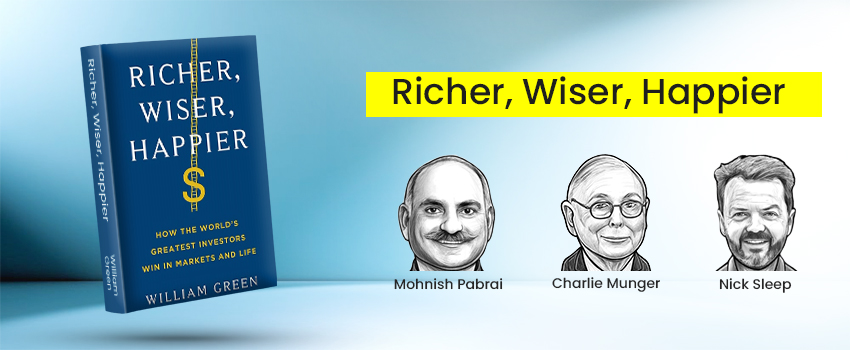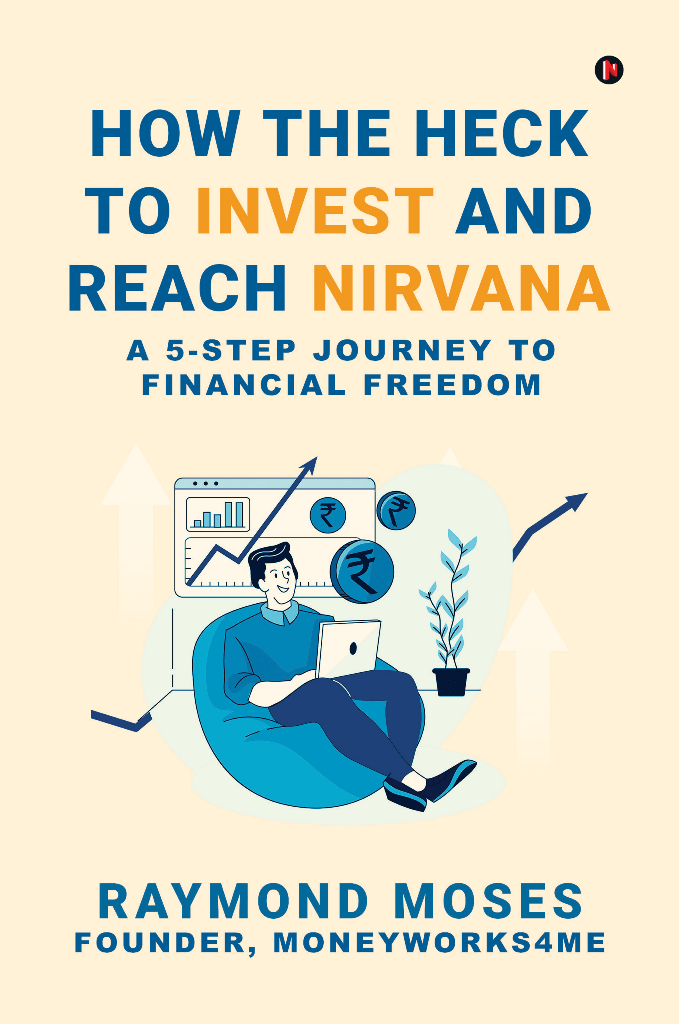This book by William Green is not just another financial advice book; it's a comprehensive guide to living a richer, more meaningful life. The book explores central ideas from renowned investors like Mohnish Pabrai, Howard Marks, and Nick Sleep. While also exploring high-performance habits and defense against idiocy. The process we follow at moneyworks4me resonates with many ideas drawn from these super investors and this book review is to give you a glimpse into their thinking.
Chapter 1 - The Man Who Cloned Warren Buffett
I believe in the discipline of mastering the best that other people have ever figured out. I don’t believe in just sitting down and trying to dream it all up yourself. Nobody’s that smart. —Charlie Munger
The book starts with Mohnish Pabrai, who is an Indian-American businessman, investor, and philanthropist. His fund, since its inception in 1999, has delivered 25% annualized returns, easily beating the market most years. Some takeaways from conversations the author had with him are summarized below.
Mohnish Pabrai’s rules-
- Rule 1: Clone like crazy.
- Rule 2: Hang out with people who are better than you.
- Rule 3: Treat life as a game, not as a survival contest or a battle to the death.
- Rule 4: Be in alignment with who you are; don’t do what you don’t want to do or what’s not right for you.
- Rule 5: Live by an inner scorecard; don’t worry about what others think of you; don’t be defined by external validation.
Chapter 2- The Willingness to Be Lonely
It is impossible to produce superior performance unless you do something different from the majority. —Sir John Templeton
John Templeton was an American-born British investor, banker, fund manager, and philanthropist. In 1954, he entered the mutual fund market and created the Templeton Growth Fund, which averaged growth over 15% per year for 38 years.
Like Buffett and Munger, he had an unemotional appreciation for a mispriced bet that offered an asymmetry between risk and reward. A few of his lessons are-
- First of all, beware of emotion: “Most people get led astray by emotions in investing. They get led astray by being excessively careless and optimistic when they have big profits, and by getting excessively pessimistic and too cautious when they have big losses.”
- Second, beware of your own ignorance, which is “probably an even bigger problem than emotion. So many people buy something with the tiniest amount of information. They don’t really understand what it is that they’re buying.”
- Third, you should diversify broadly to protect yourself from your own fallibility.
- Fourth, successful investing requires patience.
- Fifth, the best way to find bargains is to study whichever assets have performed most dismally in the past five years, and then to assess whether the cause of those woes is temporary or permanent.
- Sixth, “One of the most important things as an investor is not to chase fads.”
Chapter 3- Everything Changes
That everything changes is the basic truth for each existence. No one can deny this truth, and all the teaching of Buddhism is condensed within it. —Shunryu Suzuki, Zen Mind, Beginner’s Mind
Howard Marks is an American investor and writer. He is the co-founder and co-chairman of Oaktree Capital Management, the largest investor in distressed securities worldwide. Among numerous leanings from him, the author gathers-
- The importance of admitting that we can’t predict or control the future.
- The benefits of studying the patterns of the past and using them as a rough guide to what could happen next.
- The inevitability that cycles will reverse and reckless excess will be punished.
- The possibility of turning cyclicality to our advantage by behaving countercyclically.
- The need for humility, skepticism, and prudence in order to achieve long-term financial success in an uncertain world.
Chapter 4- The Resilient Investor
The real trouble with this world of ours is not that it is an unreasonable world, nor even that it is a reasonable one. The commonest kind of trouble is that it is nearly reasonable, but not quite. Life is not an illogicality; yet it is a trap for logicians. It looks just a little more mathematical and regular than it is: its exactitude is obvious, but its inexactitude is hidden; its wildness lies in wait. —G. K. Chesterton
5 rules of Jean-Marie Eveillard, a French international investor-
- First, we need to respect uncertainty.
- Second, to achieve resilience, it’s imperative to reduce or eliminate debt, avoid leverage, and beware of excessive expenses, all of which can make us dependent on the kindness of strangers.
- Third, instead of fixating on short-term gains or beating benchmarks, we should place greater emphasis on becoming shock-resistant, avoiding ruin, and staying in the game.
- Fourth, beware of overconfidence and complacency.
- Fifth, as informed realists, we should be keenly aware of our exposure to risk and should always require a margin of safety. (We have built this tool for all our stocks, check MOS and MRP here).
Chapter 5- Simplicity Is the Ultimate Sophistication
The great paradox of this remarkable age is that the more complex the world around us becomes, the more simplicity we must seek in order to realize our financial goals.... Simplicity, indeed, is the master key to financial success. —Jack Bogle
Joel Greenblatt is an American hedge fund manager and investment officer at Gotham Asset Management. He is the author of the books You Can Be a Stock Market Genius and The Little Book That Still Beats the Market. Joel follows Benjamin Graham’s footsteps of value investing and the author highlights learning from him-
- First, you don’t need the optimal strategy. You need a sensible strategy that’s good enough to achieve your financial goals.
- Second, your strategy should be so simple and logical that you understand it, believe in it to your core, and can stick with it even in difficult times when it no longer seems to work.
- Third, you need to ask yourself whether you truly have the skills and temperament to beat the market.
- Fourth, it’s important to remember that you can be a rich and successful investor without attempting to beat the market.
Chapter 6 - Nick & Zak’s Excellent Adventure
Nick Sleep's reputation as an ace value investor is quite well known. He spent over a decade managing the Nomad Investment Partnership alongside Qais Zakaria, and the duo became particularly well-known for their long-term approach. Lessons drawn from them are-
- First, they provide a compelling example of what it means to pursue quality as a guiding principle in business, investing, and life—a moral and intellectual commitment.
- Second, there is the idea of focusing on whatever has the longest shelf life, while always downplaying the ephemeral.
- Third, there is the realization that one particular business model— a scale economy shared (Amazon) —creates a virtuous cycle that can generate sustainable wealth over long periods.
- Fourth, it’s not necessary to behave unethically or unscrupulously to achieve spectacular success, even in a voraciously capitalistic business where self-serving behavior is the norm.
- Fifth, in a world that’s increasingly geared toward short-termism and instant gratification, a tremendous advantage can be gained by those who move consistently in the opposite direction.
Chapters 7 & 8 - High-Performance Habits and Don’t Be a Fool
I think that people underestimate—until they get older—they underestimate just how important habits are, and how difficult they are to change when you’re forty-five or fifty, and how important it is that you form the right ones when you’re young. —Warren Buffett
The best investors build an overwhelming competitive advantage by adopting habits whose benefits compound over time.
Defence against idiocy from Charlie Munger and Shubin Stein-
- The first mental trick we should learn from Munger as a safeguard against stupidity: imagine a dreadful outcome; work backward by asking yourself what misguided actions might lead you to that sorry fate; and then scrupulously avoid that self-destructive behavior. For a start, he says, “Don’t pay too much. Don’t go for businesses that are prone to obsolescence and destruction. Don’t invest with crooks and idiots. Don’t invest in things you don’t understand.”
- The habit of actively collecting examples of other people’s foolish behavior is an invaluable antidote to idiocy. In fact, it’s the second great anti-stupidity technique we should learn from Munger.
- “I like people admitting they were completely stupid horses’ asses. I know I’ll perform better if I rub my nose in my mistakes. This is a wonderful trick to learn.” Indeed, it’s the third trick we must learn from him in our campaign to constrain our own stupidity.
- Adherence to process is an indispensable safeguard: “Always honor it because that’s going to keep you out of trouble.” This idea of adopting a few standard practices and unbendable rules is our fourth technique for reducing stupidity.
- Munger admires unflinching determination to seek out “disconfirming evidence” that might disprove even the most cherished beliefs. This mental habit, which takes many different forms, is our fifth defense against idiocy.
- This emphasis on adopting systematic analytical procedures is the sixth strategy in our epic quest to be non-idiotic.
- The scientific literature shows that hunger, anger, loneliness, tiredness, pain, and stress are common “preconditions for poor decision” So Shubin Stein uses an acronym, HALT-PS, as a reminder to pause when those factors might be impairing his judgment and postpone important decisions until he’s in a state in which his brain is more likely to function well. This is our seventh technique for reducing avoidable stupidity.
We would encourage our readers to keep on coming back to this blog and re-reading these lessons till they are fully ingrained.
Already have an account? Log in
Want complete access
to this story?
Register Now For Free!
Also get more expert insights, QVPT ratings of 3500+ stocks, Stocks
Screener and much more on Registering.







 Download APP
Download APP





















Comment Your Thoughts: